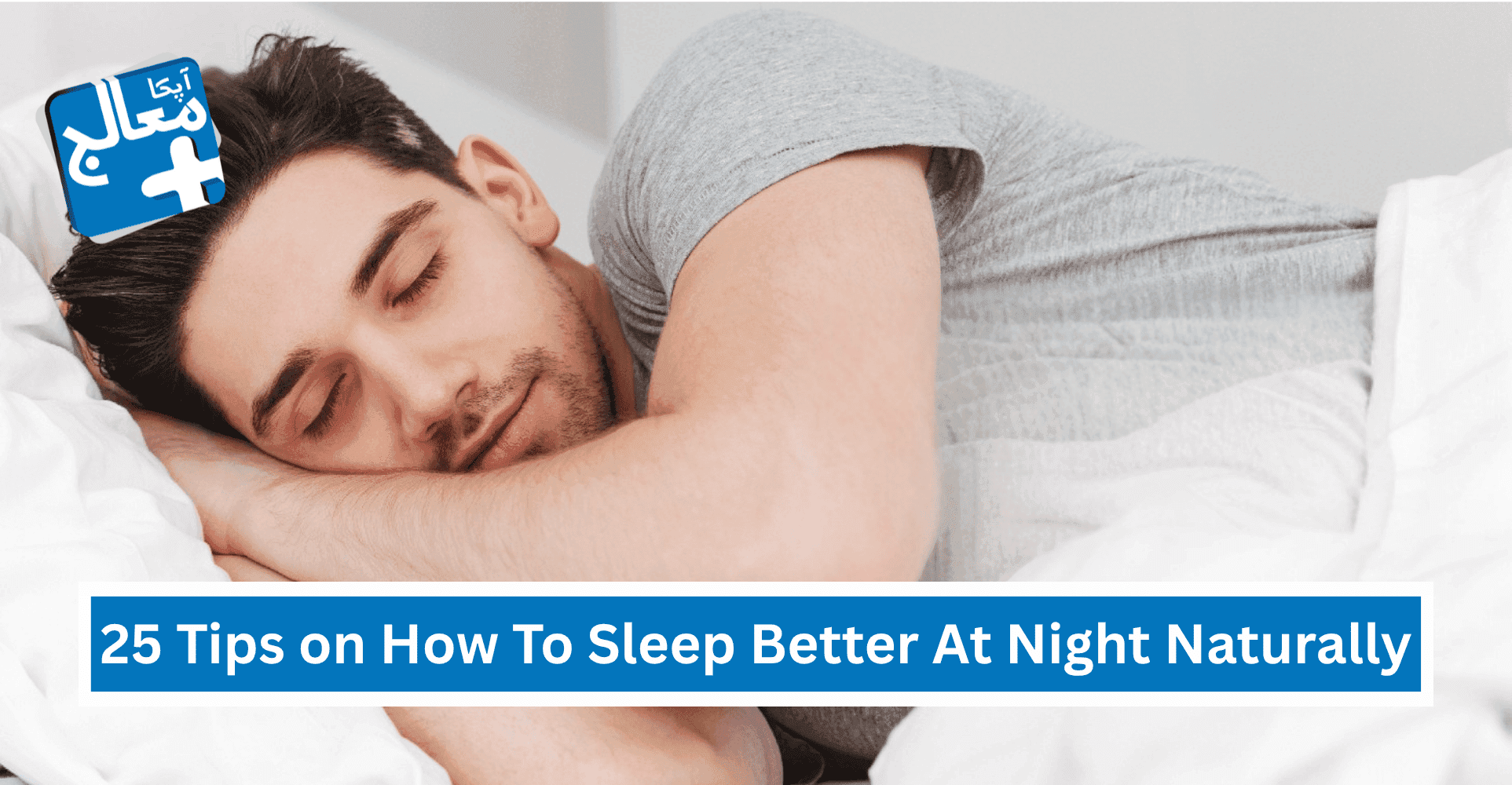25 Pro Tips On How To Sleep Better At Night Naturally

Are you tired of tossing and turning every night, struggling to fall asleep? Sleep is one of the most important factors of health, and at the same time, one of the hardest fought. Forgetting about the need for a proper night’s rest has its price; you are less likely to be in a good temper and productive, and your health is at risk in the long run.
If you want to know how to sleep fast, the benefits of sleep, or natural remedies for sleep, then this guide is for you. Here are 25 ways to sleep better, or in other words, how to wake up fresh every morning.
Also read: "9 Powerful Health Benefits of Cucumber, Nutrition Facts & Best Uses"
25 Pro Tips for How to Sleep Better at Night
1. Establish a Sleep Schedule (نیند کا شیڈول مرتب کریں)
It's like routine builds a good life inside your body. You can fall asleep fast when going to bed and wake up at the same time during the day. You even wake up refreshed, too.
Pro Tip: Stick to your schedule even on weekends to maintain consistency.
2. Create a Relaxing Bedtime Routine (آرام دہ سونے کا معمول بنائیں)
You may create a calming pre-sleep ritual, like taking a warm bath, journaling, or practicing mindfulness. These activities signal your body that it is time to wind down.
Pro Tip: Avoid stimulating activities like watching TV or scrolling through social media right before bed.
3. Limit Screen Time (اسکرین ٹائم محدود کریں)
The light of screens that emit blue light can inhibit melatonin production, and the production of melatonin hinders sleep. Try not to use screens at least one hour before bedtime.
Alternative: Use blue light-blocking glasses or enable night mode on your devices if screen time is unavoidable.
4. Keep Your Bedroom Cool (بیڈروم ٹھنڈا رکھیں)
Temperature is an important factor in sleeping. The ideal temperature to sleep at is between 60-67 degrees Fahrenheit or 15-20 degrees Celsius.
Quick Fix: Use a fan or air conditioning to maintain a comfortable temperature.
Also read: "9 Folic Acid Benefits, Usage, Importance, and More"
5. Avoid Heavy Meals Before Bed (رات کے کھانے میں ہلکا کھائیں)
Even dining before bedtime causes digestion difficulties and indigestion when getting to sleep.
Pro Tip: Choose sleep-inducing snacks such as an apple or a handful of light almonds.
6. Reduce Caffeine and Alcohol Intake (کیفین اور الکحل کم کریں)
When you do keep alert, alcohol tends to disrupt the sleep cycle, so best avoided at the end of the day.
Better Choice: Switch to herbal teas like chamomile or peppermint for a calming effect.
7. Use Essential Oils (خوشبو دار تیل استعمال کریں)
Lavender, chamomile, and sandalwood are essential oils that promote relaxation and better sleep through their calming properties.
How to Use: Add a few drops to a diffuser, pillow spray, or warm bath.
8. Exercise Regularly (باقاعدگی سے ورزش کریں)
Regular exercise will also help improve the quality of sleep. Just avoid vigorous exercises close to bedtime.
Best Time to Exercise: Early morning or late afternoon for optimal results.
9. Optimize Your Mattress and Pillow (بہترین گدا اور تکیہ منتخب کریں)
The lack of sleep is from an uncomfortable sleep surface. Invest in good-quality mattresses and pillows according to your preferences.
Tip: Replace your mattress every 7-10 years for maximum comfort and support.
Also read: "Managing Diabetes: The Role of Diet, Exercise, and Medication"
10. Practice Deep Breathing (گہری سانس لینے کی مشق کریں)
Deep breathing exercises help activate your parasympathetic nervous system, signaling your body to relax.
Exercise: Inhale for 4 seconds, hold for 7 seconds, and exhale for 8 seconds. Repeat until you feel calm.
11. Try Progressive Muscle Relaxation (پٹھوں کو آہستہ آہستہ آرام دیں)
This technique involves tensing and relaxing each muscle group to release physical tension.
How to Do It: Start from your toes and work your way up to your head.
12. Avoid Napping Late in the Day (دن کے آخر میں جھپکی نہ لیں)
While short naps can be refreshing, late-afternoon naps might interfere with nighttime sleep.
Tip: Limit naps to 20-30 minutes earlier in the day.
13. Limit Water Intake Before Bed (سونے سے پہلے پانی کی مقدار کم کریں)
Drinking too much water in the evening can lead to frequent bathroom trips, disrupting your sleep.
Advice: Hydrate well during the day and cut back in the hours before bedtime.
14. Block Out Noise (شور ختم کریں)
Noise interference may interfere with breaking up your sleep pattern. Try using earplugs or a white noise machine for a noise-free area.
Alternative: Try calming nature sounds or sleep apps.
15. Increase Exposure to Natural Light (قدرتی روشنی میں وقت گزاریں)
Daylight exposure helps regulate your circadian rhythm, improving your sleep-wake cycle.
Action Step: Spend at least 30 minutes outdoors daily.
16. Avoid Stressful Conversations at Night (رات کو دباؤ والی باتیں نہ کریں)
Stress and anxiety can keep your mind racing, making it harder to fall asleep.
Solution: Practice gratitude journaling or light reading to shift your focus.
17. Try Herbal Teas (جڑی بوٹیوں والی چائے آزمائیں)
Herbal teas like chamomile, valerian root, and lemon balm are known for their calming properties.
How to Enjoy: Sip a warm cup about 30 minutes before bedtime.
18. Meditate or Practice Yoga (مراقبہ یا یوگا کریں)
Both meditation and yoga can reduce stress and prepare your body for restful sleep.
Simple Practice: Try a 5-minute mindfulness meditation or bedtime yoga stretches.
19. Use a Weighted Blanket (وزنی کمبل استعمال کریں)
Weighted blankets provide a comforting sensation that reduces anxiety and promotes relaxation.
Best For: People with insomnia or anxiety-related sleep issues.
20. Avoid Stimulants Late in the Day (دن کے آخر میں محرکات سے پرہیز کریں)
Nicotine, sugar, and certain medications can interfere with your ability to fall asleep.
Alternative: Replace sugary snacks with protein-rich options like cheese or nuts.
21. Keep a Sleep Diary (نیند کی ڈائری رکھیں)
Tracking your sleep patterns can help identify habits or issues affecting your rest.
What to Note: Record your bedtime, wake time, and any disruptions.
22. Dim the Lights in the Evening (شام میں روشنی مدھم کریں)
Lowering light levels signals your body to start producing melatonin, preparing you for sleep.
Action: Use dimmers or switch to warm-toned light bulbs.
Also read: "Top 10 Health Benefits of Mangoes & Healthy Recipes"
23. Listen to Calming Music (پرامن موسیقی سنیں)
Soft, soothing music can create a tranquil atmosphere that helps you drift off to sleep.
Recommendation: Explore playlists specifically curated for sleep.
24. Try Visualization Techniques (تصور کی تکنیک آزمائیں)
Imagining peaceful scenes can help you relax and let go of daily stress.
Exercise: Picture yourself in a serene setting, like a quiet beach or a lush forest.
25. Maintain Consistency Even on Weekends (اختتام ہفتہ پر بھی مستقل مزاج رہیں)
Irregular schedules of sleep schedules during the weekend disrupt your body's rhythm. Stick to your routine to improve the quality of sleep.
Tip: Avoid the temptation of sleeping in or staying up late.
Also, go through: "Walking vs Running - Which is Better for Human Health"
Why is Good Sleep Important?
Good sleep is one of the requirements for total health and wellness. It develops memory, concentration, and problem-solving abilities and makes your immune system stronger with higher energy levels. Good sleep also contributes to maintaining healthy hearts, as it manages blood pressure and minimizes inflammation. Furthermore, good sleep helps balance emotions; thus, it minimizes stress, anxiety, and mood swings. Sleep is very crucial for keeping your weight in a healthy state because it regulates hormones that regulate hunger. Therefore, quality sleep enhances the usual day-to-day body, mental, and psychological operations.
What are the Sleep Deprivation Side Effects on Your Body?
Sleep deprivation is an assault on both your physical and mental health. It depletes the immune system, which increases the risk for diseases, and the risk for heart disease, diabetes, and high blood pressure. The mind is also involved, weakening focus, memory, and decision-making capacities, making you vulnerable to accidents. Emotionally, sleep deprivation creates stress, irritation, and depression. While some techniques claim to teach how to sleep 8 hours in 4 hours, consistent quality sleep is irreplaceable for overall health and long-term well-being.
You may also like to read: "Top 10 Ways To Boost Your Immune System"
In the End:
Getting quality sleep is not as complicated as most people would want it to be. When you add these natural ways to sleep better to your lifestyle, you can experience the value of having a good sleep and face every day with vigor. Remember, consistency is key, and small changes can lead to big improvements. Begin using these tips today, and then in no time at all, you will be sleeping like a baby. Sweet dreams!
If you are facing any sleep disorders or mental health issues, feel free to consult with the best psychologists in Pakistan by visiting www.apkamuaalij.com. For a quick consultation, dial 0423-2377001 and book your doctors through Apka Muaalij, the best telehealth platform in Pakistan.
Most Frequently Asked Questions (FAQs)
How to increase deep sleep naturally?
To increase deep sleep, naturally take light meals at night, set sleep schedules, exercise regularly, and reduce stress.
What kind of foods help you fall asleep fast?
Cherries and dairy are rich in melatonin, which makes you sleep faster.
How to sleep fast in 5 minutes?
Use a 4-7-8 breathing technique to fall asleep within 5 minutes.
How to get a good night's sleep and wake up refreshed?
Stick to the schedule, do not go to bed hungry or stuffed, and create a comfortable environment around you.
Why is it more important to sleep at night than day?
The body's natural circadian cycle is synchronized with nighttime sleep, which supports the best possible hormonal equilibrium, cognitive performance, and general wellness.
What food should be avoided at night?
Steer clear of heavy, oily, spicy, and sugary foods at night because they can interfere with digestion and sleep.

Dr. Muhammad Usama, RPh
Dr. Muhammad Usama, RPh, is a Senior SEO Content Writer with 6 years of experience, primarily contributing to healthcare and wellness. He crafts engaging, research-driven, and SEO-optimized blogs that simplify complex concepts for readers. Through his unique blend of expertise in content creation, SEO copywriting, and marketing, Dr. Usama is dedicated to producing impactful content that raises awareness, promotes wellness, and supports patient-centered initiatives.